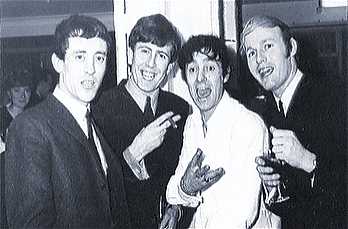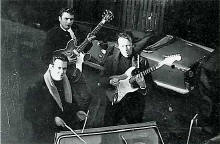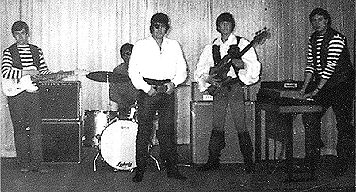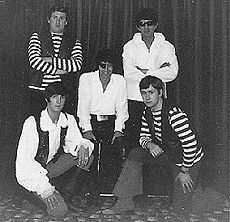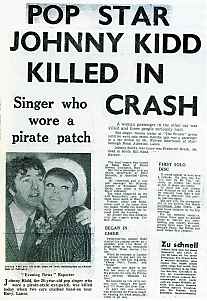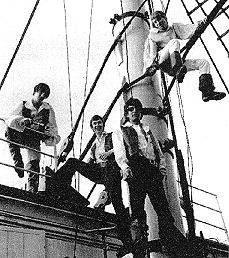|
|
5: 1966-67: Gotta Travel On
In February 1966 Kidd undertook a "solo" session and recording the soul-tinged "It's Got To Be You" plus a second rendition of "I Hate Getting Up In The Morning". On these the backing was by an orchestra arranged by Johnny Harris and backing vocals courtesy of the Marionettes, with whom Kidd was impressed when he'd first seen them at the Ideal Home Exhibition. H'd also taken the plunge and married long-term girlfriend Jean Complin at Caxton Hall in London on the 18th February, with Johnny Spence in attendance as Best Man. Although a smallish affair the reception was attended by some of his good friends in the biz, including members of the Hollies, Georgie Fame, Tom Jones, maniacal Pretty Thing drummer Viv Prince, and promoter Tito burns. Eric Delaney was also present - he'd been instrumental in originating the idea of carrying around his own lights and props to the young Freddie Heath. Then it was business as usual, their honeymoon having to wait (until May!) as a gig in Wrexham beckoning on the following night! In the meantime things were not quite so healthy in the working front as bookings had been slowly decreasing in line with their profile as their record sales had taken a dip after the heady days of '63/'64. and Kidd was getting a bit concerned as his home was not a cheap affair to run, located as it was in a desirable area with neighbours such as Carry On star Kenneth Connor. "It's Got To Be You" was finally released on April 15th, which Kidd dedicated to his new wife Jean. Four days later after a gig at at Bletchley's Wilton Hall Johnny Kidd and the Pirates parted company as the Pirates broke away in an attempt to sink or swim by their own efforts. In Kidds' view this single was a make-or-break disc, but a much-needed hit still managed to elude the singer, promotion was not what it may once have been, and a much-needed television exposure was given over to the newer "hip" groups whose styles were beginning to leave Johnny Kidd as a rocker behind. He gave thought toward giving up the performing side altogether.
Not for the first time in his career, Kidd was without a crew. 18-year old Mike Rudzinski of Merseyside group the Avengers saw an ad in the Melody Maker regarding Johnny Spence referring to the fact that had Left Kidd and wanted to form his own band. On cheekily asking "with knocking knees while speaking to one of his idols", Rudzinski got Spence to give him Kidd’s phone number. After a long conversation, Kidd (with road manager Johnny Irving in tow) arranged to go to Wallasey and view the band, Rudzinski (bass), Bill Knaggs (lead) and Les Hall (drums).
The plan was that following the tour the band would be brought to London and kit them out properly for stage wear, plus do some recording sessions. This sadly came to nothing as both Knaggs and Hall were settled both domestically and employment-wise and thus unsure about the future by going professional. Kidd fronted an assortment of musicians for live dates which were becoming thinner on the ground, and he pondered on his future. He became depressed and began openly talking about quitting performing altogether and it was only when Jean actually walked out for a few days that Kidd pulled himself together and sorted himself out. Organist Ray Soaper was one of the musicians currently in Kidds' employment, and it was he who contacted Nick Simper, former bassist in Buddy Britten and the Regents and invited him to join. "He knew I idolised Kidd," recalled Simper, who not only welcomed the opportunity but also introduced loud drummer Roger "Solly" Truth (real name Roger Pinner), another ex-Regent. A search for a guitarist failed to pin anyone down until guitarist Mick Stewart arrived to complete the line-up. Because of Kidd's plan to change tack and go solo he'd actually sanctioned his previous line-up to keep the Pirates' name officially (under which name Mick Green and Johnny Spence are still going strong today) and so the re-jigged line-up commenced live work in May 1966 as Johnny Kidd and the New Pirates. Simper later recounted the increasingly positive feeling to historian Pete Frame.
The portents were indeed highly promising. The new group combined rock 'n' roll appeal with a soul/R&B perspective and seemed destined to find a new audience. Typically, the New Pirates would play half a dozen songs, mostly with Mick Stewart on vocals before the Guv'nor himself took centre-stage, plunging his cutlass into the stage where it would wave from side to side. During "Shakin' All Over" Kidd would literally shake from head to toe. Mike West was the only other singer Simper had ever seen shake like that. "The scenes were so tremendous as to be unbelievable! We received tremendous applause and demands for encores throughout the week. Of course the show-stoppers were "I'll Never Get Over You" and "Shakin' All Over". After the last appearance the fans were so enthusiastic that Johnny had to leap from the rear entrance into the moving van to escape. So it seemed that Johnny had a future in cabaret." The Pirates were a good four-man piece, however fate took a hand in reducing the New Pirate ranks by 25%. With Kidd having split a while before from manager George Cooper, gigs were a little thin on the ground so when Cooper offered a good date at Weston-Super-Mare in Somerset to sub for an unavailable Georgie Fame they jumped at it. Very much a last-minute arrangement Soaper could not be contacted and was left behind, much to his later annoyance. On the way down they met Eden Kane, apparently also on his way to the same gig. Fearing a double booking, Kidd & Co dashed off to beat Kane to the spot, only to get lost in the back lanes of Somerset. No matter - Kane and Kidd WERE on the same bill, but with Kidd on top! Soaper's absence put the emphasis back to guitar, bass and drums and all agreed afterwards that it sounded better as a Power Trio again. Soaper was unhappy to be dropped but understood why and appreciated Simper breaking the news personally - after all he was the catalyst in teaming the 'old' Regents up with the renewed Kidd. EMI's interest seemed to perk up again and according to Nick Simper plans were again began for an album, probably titled "Johnny Kidd Sings Gene Vincent", owing to Gene having become a good friend of Johnny's during his stay in the UK in the 1960's. The cabaret scene beckoned and that is the route where Kidd would have gone down. In the meantime, August saw them completing their "debut" single which combined a fabulous reading of Rowland Barter's brand new number "Send For That Girl" with a great new interpretation of "The Fool", a long-time Kidd favourite. Barter was currently bassist in the Issue, backing group for the songwriters turned singers David and Jonathan who Kidd toured with soon after. Two finished masters of the song on the topside exist, the basis of each from the same best take. The first remained unreleased until 1983, while a remixed version with Harry Robinson's additional orchestration became slated as the "A" side.
Of the Band's appearances in October, the press described the gig at Cromer in Norfolk; "Always a very visual performer, his voice sounded more powerful today than when he was in the charts! A really tight backing was provided by the Pirates for this legend of British Rock 'n' Roll". RAF Waddington was on 1st October 1966 with Simper describing it as "a tremendous gig, Johnny was in top form." A keen and excited Kidd was looking forward to the next gig at Bolton on Friday 7th October. For this trip Kidd was assisted by friend Wilf Isherwood, his long-time roadie Johnny Irving insisted on remaining behind on this occasion to devote some time to his business. Also accompanying Kidd was his wife Jean and their young daughter Cilla, who was to see her Dad perform onstage for the first time. Trips "oop North" benefited slightly from having the southern part of the M1 in place but only as far as the Midlands, after which the grind of the normal road network took over. Most of the entourage arrived late at Bolton (Mick Stewart had beaten them to it) but with the doors having only just opened there were few people about and still time enough to get set up. The Manager took a different view however, interpreting this as a late arrival and subsequently a serious breach of contract. Despite protestations Kidd insisting that the band be paid and offering to waive his personal fee in the process, the manager (as Simper put it) "Played the Hitler part" and cancelled the show outright. A disappointed group (minus Jean) instead trooped over to the Imperial at nearby Nelson as they got on quite well with the manager there with a view to look for bookings. It was just after midnight and while travelling back, the car in which Kidd and Simper were passengers was involved in a collision three miles south of Bury, Lancashire. Traffic had to be diverted while firemen cut the injured out of the wreckage. Simper was hospitalised at Bolton Royal Infirmary with lacerations, head and back injuries plus a badly smashed-up arm but tragically Johnny Kidd was pronounced dead on arrival.
Screaming Lord David Sutch and his Savages were touring Germany and Dave popped out to get a copy of the previous day's Evening Standard newspaper. He returned to base, deeply shocked at having just read that his mate the Kidd was dead, and the rest of his band just wasn't able to take it in either. After the passing of his friend, Johnny "Irvo" Irving felt somehow responsible for not being there for the Kidd. Resolutely sticking to his guns he refused all future offers including the Shadows and the Who (plus the New Pirates) and was never involved in the music business again. Johnny Kidd's funeral took place at the Golders Green Crematorium on Wednesday 12th October. The bright and solid "Send For That Girl" was released in November which the current crew of New Pirates believed had a good chance of being a hit. As something perhaps cynically seen nowadays as a "good career move", the bands' now departed leader as a focus back then was as good as a virtual death knell for the record. The lack of significant airplay coupled with EMI's less-than-forceful publicity push conspired to see the final record follow the path of the previous few releases, something the remainder of the band were literally physically unable to do anything about in promoting it. After all said and done, it was a sadly muted end to the recording career of one of Britain's truly original Rock 'n' Rollers. |
|
